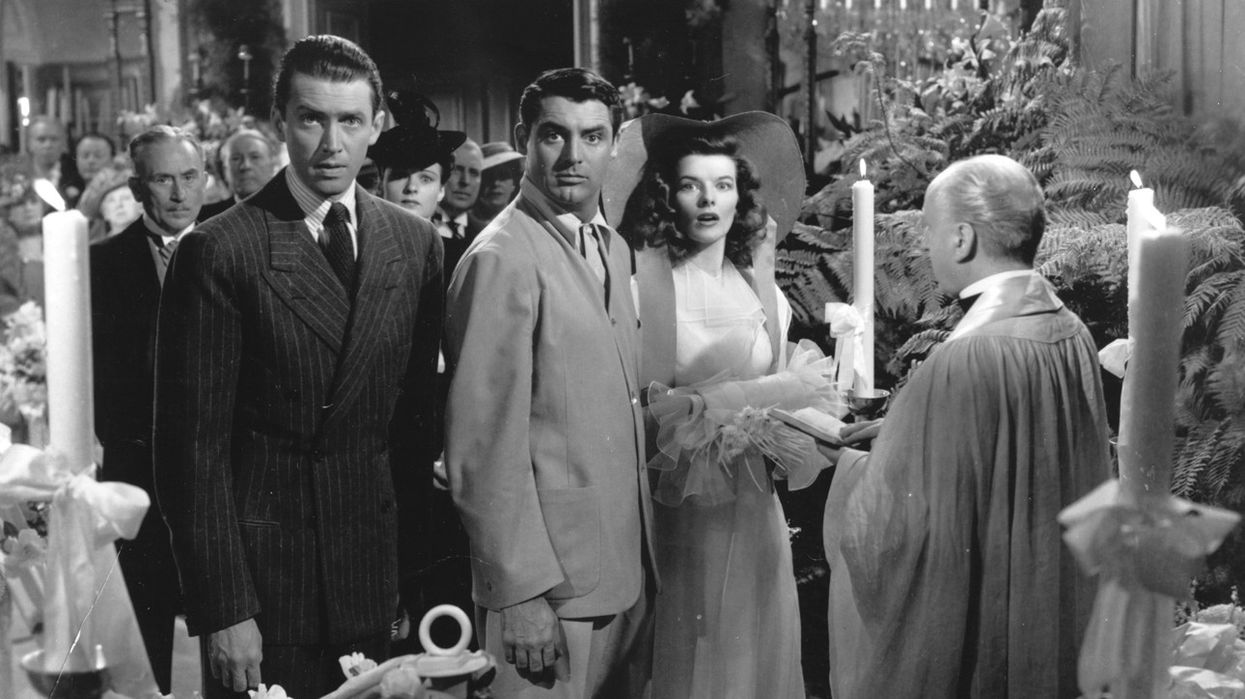What is the Transatlantic Accent in Movies?
Actors used to have very different, yet standardized, American accents in the earlier part of 20th century cinema.

'The Philadelphia Story'
If you've ever seen an American movie from around the 1940s and earlier (and if you're reading this in the US you probably have), you might have wondered why the performers sound so different from actors today.
This video from HowStuffWorks explains the accent, referred to as the Mid-Atlantic or Transatlantic accent:
What is the Transatlantic Accent in Movies?
The Transatlantic accent, also known as the Mid-Atlantic accent, is a cultivated accent of English blending together prestigious American and British English ways of speaking.
This accent was not commonly heard in day-to-day speech but was more of an affected set of speech patterns adopted in the United States for theater, film, and radio in the early to mid-20th century. It is not native to any location but rather, it's a consciously acquired accent.
The Transatlantic accent's key characteristics include a blend of American and British pronunciations, often leaning towards a more British-sounding intonation and rhythm, while maintaining some American vowel sounds.
The Transatlantic Accent And High Society
The accent was taught in acting schools and was considered to be a sign of sophistication and education. It was used by actors in the Golden Age of Hollywood and by American aristocrats, especially in the Northeastern United States.
Notable users of the accent include actors like Katharine Hepburn and Cary Grant.This accent fell out of favor in the latter half of the 20th century as attitudes towards speech and broadcasting changed, leading to a preference for more natural and regional accents in films and other media.
Learn the Transatlantic Accent | Half British, Half American 100% Wonderfulwww.youtube.com
It's not just actors from the time period, but also anyone from higher class society at the time:
This type of pronunciation is called the Transatlantic, or Mid-Atlantic, accent. And it isn’t like most other accents – instead of naturally evolving, the Transatlantic accent was acquired. This means that people in the United States were taught to speak in this voice. Historically Transatlantic speech was the hallmark of aristocratic America and theatre. In upper-class boarding schools across New England, students learned the Transatlantic accent as an international norm for communication, similar to the way posh British society used Received Pronunciation – essentially, the way the Queen and aristocrats are taught to speak.
If you're from New England, you've probably heard the accent from older speakers who grew up around this time. As for performers from this era, since this was the prevailing accent of upper-class societies, it was also the one most commonly taught to actors. Though it fell out of use around the same time people stopped using it in common society, you can hear it in plenty of older films. Method acting and other more natural styles distanced themselves even further from this put-on accent, and strived for more authenticity in the performance, which meant accents that sounded more like real people, and more appropriate for their characters.
Examples of the Transatlantic Accent in Movies
The Transatlantic accent, with its unique blend of American and British English, was particularly prominent in movies from the 1930s to the 1950s.
- Katharine Hepburn: She is one of the most famous users of the Transatlantic accent. Almost any of her films, like Bringing Up Baby (1938), showcase her distinctive speech.
- Cary Grant: Another iconic user of the accent, Grant's voice in films like North by Northwest (1959) and His Girl Friday (1940) is a classic example.
- Bette Davis: Known for her powerful screen presence, Davis used this accent in many of her films, including All About Eve (1950).
- Claude Rains: Particularly in Casablanca (1942), Rains, though British, adopted a Transatlantic accent for his role.
- Rosalind Russell: In His Girl Friday (1940), Russell used a rapid-fire Transatlantic accent, matching Cary Grant's delivery.
These movies not only provide excellent examples of the Transatlantic accent but also are significant in the history of American cinema.
For another example of the Mid-Atlantic accent, here's Katharine Hepburn and Cary Grant from The Philadelphia Story:
And for fun, here's Australian Cate Blanchett doing the accent as she plays Hepburn in The Aviator:
For a bit of contrast, Emma Stone talks about how she prepared for Gangster Squad with a Mid-Atlantic accent (since it takes in the 40s), but director Ruben Fleischer wanted something a bit more natural-sounding:
At this point it's an accent we tend to make fun of (usually in a good-natured way), but as realism entered American cinema, the writing would have already been on the wall for this kind of fake, non-descript Mid-Atlantic accent even if it hadn't started falling out of use earlier than that.
The Transatlantic accent offers a fascinating glimpse into a unique period in American cinema and theater history.
This consciously cultivated accent, blending American and British English, was more than just a way of speaking; it represented sophistication, education, and a certain era of filmmaking. While it has largely fallen out of use, the Transatlantic accent remains a distinctive and memorable element of classic films.
Source: HowStuffWorks
- This Dialect Expert Breaks Down the Art of the Movie Accent ›
- What Is Diction? Definition and Examples ›

 'Sunfish (& Other Stories on Green Lake)'CREDIT: JWH Films
'Sunfish (& Other Stories on Green Lake)'CREDIT: JWH Films









